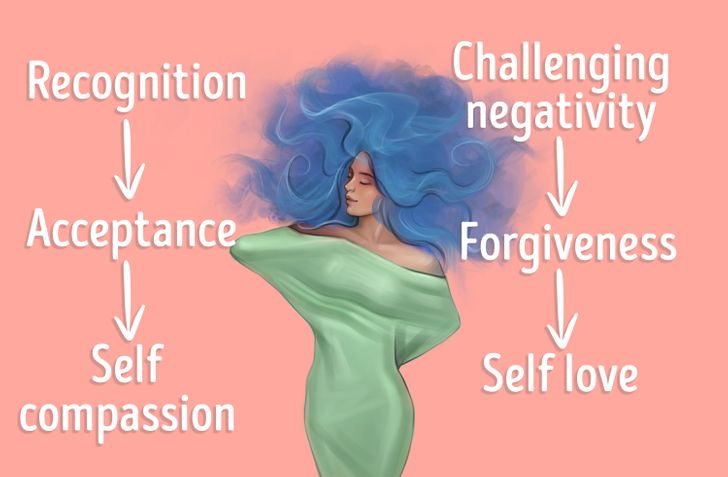How to Develop Self-Love, and How It Differs From Selfishness
Self-love and selfishness are different things. Selfishness is a destructive character trait, which places our ego in the center of the world. The people who love and respect themselves, on the contrary, know how to share love and respect with others.
At 5-Minute Crafts, we found a few good methods that will help you develop self-love.
How to start

Kristin Neff, the pioneer of self-compassion research, says, “Self-compassion involves treating yourself with the same kindness, concern, and support you’d show to a good friend.”
On the way to self-acceptance, follow these 6 steps:
- Recognition. You recognize that you’re experiencing difficult moments, emotional distress, or mental suffering but it doesn’t mean that you are weak, or a loser.
- Acceptance. You accept the fact that you have feelings that can be negative. Instead of devaluating or avoiding them, think about exactly how you feel.
- Self-compassion. Analyze your negative affirmations, like “I don’t deserve to be happy.” Admit that you have them, and ask yourself why you show compassion and accept the flaws of people you love, but you can’t feel the same way toward yourself.
- Challenging negativity. Recall stories from your life where you acted in the wrong way, think about why you acted this way. Maybe, you experienced past trauma, or you were caught in a stressful situation? Admit yourself responsible for this act and draw conclusions to avoid similar situations in the future. Think, maybe your expectations toward yourself were too high. Everyone makes mistakes, you just shouldn’t repeat these mistakes in the future.
- Forgiveness. Find a way to forgive yourself. If you offended someone, apologize to them. If your behavior was harmful, try to make it up to them. Talk to yourself to get the necessary encouragement. Accept and forgive yourself, because people make mistakes.
- Support yourself, show love and understanding. Instead of punishing yourself, try doing something pleasant for yourself. For example, use one of the methods mentioned below.
Do something pleasant for yourself, don’t devalue your desires.

Unfortunately, people often feel guilty if they want to do something for themselves. At the same time, they spend their money and time on others. If this sounds familiar, try to make a list of things that you’ve wanted to do for yourself, start to implement the first one.
What things do your put away for later? Is it a visit to a dance studio or the purchase of beautiful underwear? Some people, for example, postpone their visit to a dentist. If you don’t express love toward yourself and dedicate time to yourself, why would others do this for you?
Think positively.

Positive, optimistic thinking is the practice of focusing on the good in any given situation. It doesn’t mean that you lose connection to reality by avoiding your problems, this means that you don’t fixate on negative things. Try to look at yourself from this point of view.
Think about what you’ve achieved up to this moment, don’t devalue your achievements, find something that you like about yourself (in your character or your looks). Say good things to yourself.
Practice daily affirmations.

Affirmations are positive statements that help you to overcome self-sabotaging and negative thoughts, meaning that we repeat them often and believe in them. You need to repeat affirmations every day, just like you do morning exercises to keep your body healthy. According to researchers, these psychological exercises help us relax and gain self-confidence before an important event.
Other research says that affirmations helped their chronically stressed participants solve their problems. They are used in the treatment of depression and psychological problems.
However, you have to be careful if you have low self-esteem because affirmations can worsen your condition, especially if your desires don’t correspond to reality. So, you have to work on boosting your self-esteem.
Write a letter of support to yourself.

Imagine that you have a friend who loves you very much, accepts you the way you are, and cares for you. How would they react to your failures? What merits could they list?
Write a letter to yourself as if you were that friend. Try to show as much love and care toward yourself as possible. Look at yourself from the point of view of a loving person.
Stop listening to complaints.

There is probably someone around you who constantly complains. They waste our time and spoil our mood. Even despite your high spirits, you feel much worse after talking to this kind of person.
Try limiting your communication with people like this. And if you have to be around them, talk to them about things you’re interested in. Learn to set your boundaries and not to feel guilty saying “no” to them.
Be thankful to yourself and other people.

Try to make an imaginary or real list that will have all the things you’re thankful for and all the people you’re thankful for. They can be your parents, your friends, your strengths, and yourself. However, remember that the purpose of this list is experiencing genuine gratitude, and not just listing things.
Start keeping a diary and read what you’ve written there often. Write down as many details as possible. Not just “I’m thankful for this day,” but “I’m thankful to this day for making me happy, for delicious coffee, and for the terrific evening walk I enjoyed so much.”
Help others.

By helping others, we help ourselves. Volunteering makes us feel better. Studies have shown that people who, instead of sharing their problems and receiving support from others, helped them themselves, became less depressed.
Become a volunteer at a pet adoption center or just help others in any possible way, and you’ll feel how your sense of relatedness to others becomes stronger.